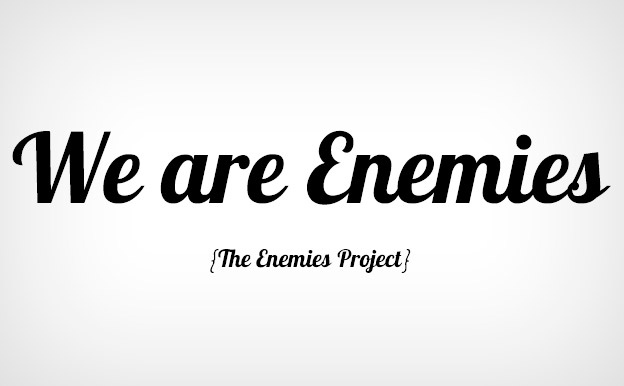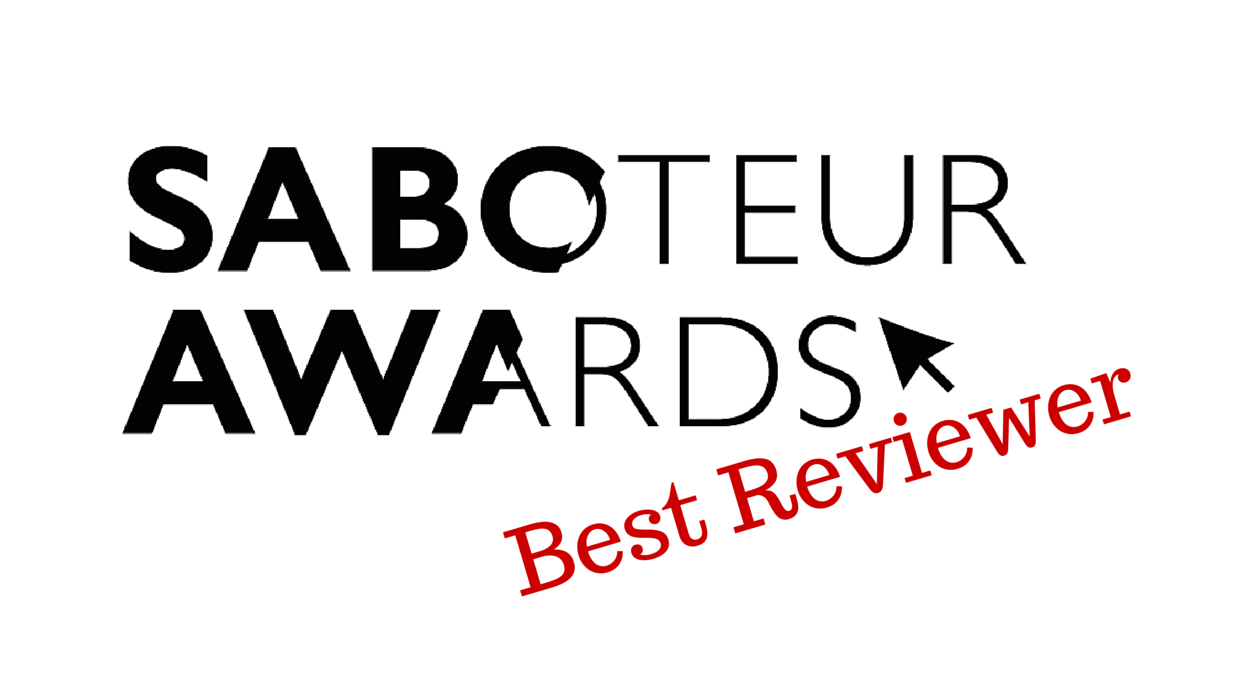Yes But Are We Enemies – English and Irish Poets Having Words – 23/09/14
Yes, but are we enemies, 23/09/2014 @ Triskel, Cork
-Reviewed by Rosie O’Regan–
Yes, but are we enemies is the intriguing title for a refreshingly eclectic group of touring and local poets. The TDC (Theatre Development Centre) at Triskel was a very suitable venue for this well attended event in Cork. It’s about twenty by sixty feet of windowless dark grey painted stone and concrete with a modest but adequate lighting rig. I call it the cave. It’s perfectly conducive for intimate happenings in theatre and poetry alike. All in all there were about fifty bums on seats (that’s bums attached to legs and spines as opposed to bus shelters and park benches) and another fifteen or so leaned on the wall or sat on a platform at the back, an impressive turnout for an experimental poetry gig.
Steven J Fowler and Christodoulos Makris who have co-curated the Irish leg of this innovative and ambitious project, graciously introduced the evening. S.J Fowler has already brought the project to four other countries, his stated aim being to encourage experimentation through poetry in collaboration, to question how we read or listen to poetry and to find new ways of composition. The Irish poets, Ailbhe Darcy, Billy Ramsell and (Dublin-based) Christodoulos Makris, along with English poets Patrick Coyle, Sam Riviere and S.J Fowler, are now coming to the tail end of the Irish tour which has included Belfast, Derry, Galway, Cork and Dublin. It will finish in London on Saturday the 27th at 7pm at the Rich Mix Arts Centre. In each city they visit, they are joined by six local poets. The collaborative combinations are ever changing, so each event, while relating to the theme, is its own animal.
In Cork, Sarah Hayden and Rachel Warriner were first on. I enjoyed their energy. The friendship they share was evident and brought a sense of fun to their piece. What for me was most impressive was that while they each have a distinctly unique voice, to my ear in this instance they seemed to speak from one. The words were constant, almost cascading from their lips, strange star lists and a sort of haute couture of expression. In truth, I hadn’t a clue what it all meant, but I didn’t really mind as their delivery had a dynamism. They would finish each other’s sentences and punctuate moments by speaking in unison. I was at the very back of the room and in terms of performance, I would have liked a little more volume. Unfortunately I missed some words and ends of sentences. They both came across as very comfortable in their poetic form, intensely experimental and avant-garde. Although difficult for me to hold onto any sense from the words, I found their flow exciting and wildly puzzling. The word I took away is ‘smirm’. It’s not in my dictionary, but I think it should be.
Cal Doyle and Doireann Ní Ghríofa followed with their theme of the city and spatial history. Straight away, I was deep in Cork, ‘Tetris city’. The RNH hall looming became a huge movable piece in an ‘endless change’ of a concrete jigsaw. ‘Walls fall’, ”the city looks the other way”. Cal and Doireann’s collaboration was a series of poems celebrating the strong contrast between their voices. Cal hit us with gritty urbanity, got unashamedly stuck into the hard core ‘underbelly’ of city living, ‘ dance, fuck, dance, fuck…dance, dance, dance, cum’. Who doesn’t love a good ol’ boogie? Doireann then, with the clarity of a strong and sensitive woman, seemed to absorb Cal’s edgy images, soften and return them changed, ‘reconfigured’, giving an acceptance and warmth to the harshness, ‘the city pulses our blood’, ‘the city lives in us too’. Lines such as ‘ a door that creaked in like pleats in an accordion’, sent a butterfly flutter through the room. I fully enjoyed this partnership, the masculine and feminine combined. Cal was for me, at times akin to an educated punk, a rebel to Doireann’s grounded, gentle wisdom.
Next up were Eleanor Hooker and Sarah Hesketh. Through their collaboration they discovered themes of retrieval, memory, loss and killing. ”Water is tender to the dead’. The image of a dead calf appearing and disappearing on the edge of a lake, was achingly delicate, mysterious and true. I felt a purity in Eleanor’s presence, a brightness in Sarah’s. With Eleanor there is the sense of a woman who breathes water. She is of the lake. When ‘Granny’s voice fell from a sleeve’, I longed for a memory of a woman I’ve never met. The words ‘forge a melody from shock’ disturbed something in me, something fearful, something buried. Is poetry the lake that can bring all things to the surface, however dark or unresolved, however deep her mud? Are we ‘our own inconsequence’? Eleanor and Sarah’s presentation resonated with me. I was glad to discover two writers that I’ve not heard read before. I’m only sorry that my ability to maintain focused attention wasn’t better and that my note-taking was not in reality, an illegible scrawl.
Fourth in the line up were Afric McGlinchey and Paul Casey. They penned a fine collaborative poem, matched each other line for line, layered image upon image, speaking from a universal perspective:
Enemies are always true to each other, more faithful than lovers…
more faithful than rain to fire, shadow to light, child to mother,
the chick who climbs out of the egg and begins to peck at her.
The person responsible for inspiring so many excellent poets with the undoubtable worthy concept ‘Yes, but are we enemies’ was next to take the stage. Steven J.Fowler was joined by Ailbhe Darcy. They delved into the theme of a nuclear holocaust, managing to lighten the severity of their subject with a dark wit. Ailbhe spoke ‘imagination is the worst part of torture’, to which Steven quipped ‘the redemption’. I saw a mischievousness in Ailbhe. Steven had a steady self assuredness, ‘one golden boy’ appearing totally at ease with his audience. I wasn’t quite sure where the poetry was taking me, however. Like I said my attention span was wavering. I did feel safe in their hands and took this line home, ‘inundated by rude people as though we were computers and they numbers’.
Christodoulos Makris and Sam Riviere engaged in a clever letter writing exchange. It was a game of top dog that lightened the mood and inspired much laughter from the audience. ‘What is the use in talking to people who think they know better?’ None I suppose, but listening to two trying to prove the same is entertaining. When one of them piped up with ‘ignoring women is the only thing that turns me on’, I thought to myself, now that’s good comedy. Why? Because with some women it might just be a good strategy. I was happy to be introduced to Christodoulos and Sam, two new voices. Their straight talking made the overall experience a bit more playful around the concept of ‘enemies’. ‘savages come from everywhere’, yes indeed and ‘every arrival is the story of a departure’.
Patrick Coyle and Billy Ramsell were a great combination to round off proceedings. They put the performance into the poetry that was perhaps a little lacking with others who relied solely on reading from the page. Patrick had an energy to him that was buzzing. He was having so much fun himself that it couldn’t not be felt. ‘Oh de do da day’ yay! His approach was spontaneous in that he incorporated seven syllables from every other reading of the night to his, ‘do da do da’ and when he took out his smart phone, used the taping tone of the digits to emphasise a line, I was fully with him. I relished in the daftness of ‘orange rhymes with orange’ and ‘these camp-town racists who sing that song, oh de do da’ gay racists? I suppose it takes all kinds of enemies to make this special, spatial planet. Billy Ramsell who probably won’t like me at all for putting his name after that last sentence was a worthy candidate to end with. No one else enunciates quite so deliberately. He gives every word its full shape, started into his poem slowly, tasted the snap of every consonant, then gradually found himself swaying, eyes closed and words flowing. It was about memory, memory extraction, harvesting and transfer. It was memorable.



